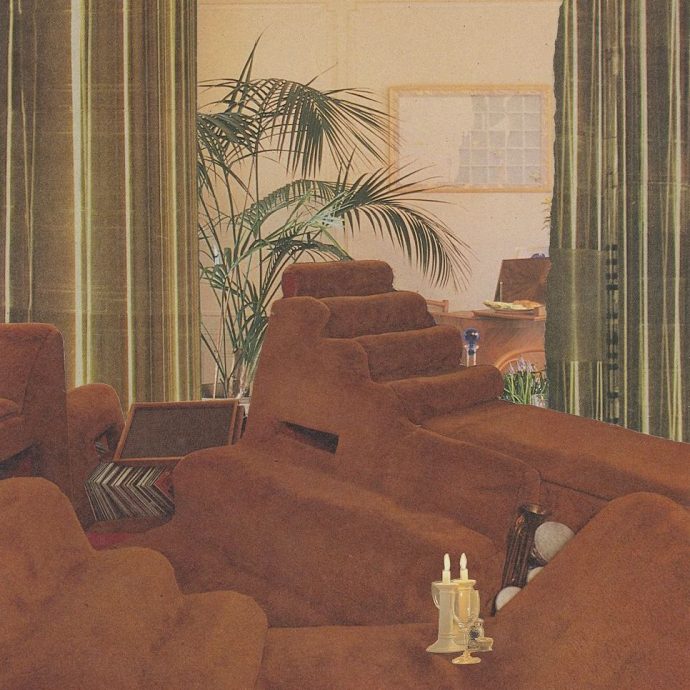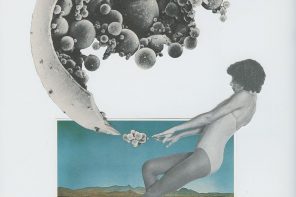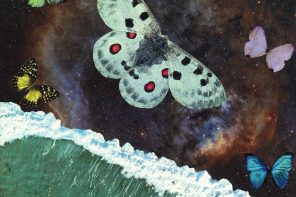Two of my five friends suggest I write about it. I have an arsenal of privately mulled-over protests that I don’t offer in response: I have not phoenixed. I’m a Russian doll in a room of mirrors; all I see are porcelain repetitions, each tinier than the one before. How do I telescope from here, eyepiece to mirror? Besides, there is no narrative arc, no triumph or resolution. I was healthy and suddenly, not—an odyssey one sentence short, clichéd, ordinary as life, which on elaboration would only read as self-important, woe-is-me.
I compress the cumbersome to a single bead: how can I write about it while still in the thicket?
They don’t answer or insist or push the subject anymore. I’m undecided if I want them to. By the time I figure a little nudge, a polite advocacy, won’t hurt, I’m a wink too late; the status quo has been restored. The spotlights cone them, as always, and I find myself already ten text blocks into their happening, adult worlds. Still blinking—my eyes strobed by the brief, disorienting flash on me—finger memory, unconscious, punctuates appropriate responses on my behalf. I’m glad they are voices from the ether; the spaces between tight black fonts and happy yellow faces aren’t much to read between.
Depending on the day’s pains and my experience of perceived invisibility, the number of individuals I classify as friends vacillates between zero and five. Three from the before, when our ground was still common; two from graduate college, who found me in the after. The things that get them written off for the day include but are not limited to:
What do you do all day then?
I wish I had your kind of time off.
You should hang out and go on adventures more; it’ll cure you.
Positive thinking is key.
But you look so normal!
You should try a little harder and constructively use all that time to build a business.
I’m sure you have perfectly normal days you can milk.
But how can you still be sick?
I can’t believe you’ve stopped all your hobbies including painting.
And, when I reply still sick with a laugh emoji: It’s great that you are embracing your illness with cheer.
On moderately better days, even I can forget the depth of my flare-ups, but “cheer” is not how I would describe the climate of my mind. “Fairly optimistic” is true. “Measured.” Also “intolerant of inspiration porn.” I rarely complain or say anything about my illness beyond one-line briefs—and that only when asked—because the last thing I want thrust upon me when I’m barely able to hold my head up is a reply with an undertone that I could try better and harder. Besides, there are only so many times you can repeat the same set of debilitating symptoms in text until they lose meaning.
The thing about chronic illness is that the half-life of compassion and novelty is very short—fleeting—fizzling out in the first quarter of onset. It is hard to empathize unwaveringly with anyone for longer than a year. And when that illness is invisible, it only cloaks the sufferer even more; looking perfectly healthy desensitizes everyone but the sick to the suffering. I understand. They mean well when they sometimes unknowingly say insensitive things that make me question if they even know me at all. I know not to hold grudges or resentment. The disappointment of being misunderstood, unseen, quickly evaporates when they launch me into their exciting lives without my asking, and I’m grateful they exist at all. And sometimes, every now and then, we can break our patterns; I remind them of my reality, they admit they don’t know what to say or how to say it, and I appreciate the thread of commiseration.
The year the Mayans prophesied the world to end, mine did—briefly—and resumed the next, lopsided: the after. The two years preceding it are hazy, foreshadowed by hair-thin fractures in the normality of my every day that nobody noticed. I have no friends from this period. The splits fissured into a crevasse on a June day in the vacation after junior college. When peers leaped into futures, I tripped blind into a cavern that yawned without reason or warning.
In the depths were a bed, a ledge of pillows, a clock without hands. Waist-length girths of wavy black limped to finger-full loops. Fingernails stunted like time. Fatigue souped and marrow desiccated. Pain, electric, handcuffed. Sleep splintered. Fevers flamed inward, lingered right under the skin, shirking measure. But most of all, everything spun. Violent. Perpetual. Unbearable. And the only proof of carnage—objective, visible, inspectable—a dark cosmic joke: “idiopathic hyperpigmentation” on my face, like smudges and streaks of kohl, the most noticeable one black tear track from the corner of my eye to mid left cheek.
I remember very little of that year. Of allopathy, I recall reams of tests, misdiagnoses, undiagnoses, dismissals, psychiatric evaluations to probe for possible psychosomatic causes, none of which were found. No alternative practices were spared, including a protective amulet of a silver inscription in gold casing that my mother made me wear on a thick black thread around my neck. The headache-inducing, nauseating oil concoction the naturopath prescribed for scalp application still stings my nose on recollection. Ayurvedic medications dulled the perpetual giddiness somewhat, helped me regain some coherence as a human, but it also cast a dark, heavy veil, as if it were constantly sifting my insides with powdered lead. When no professionals provided concrete help, we unearthed by ourselves the list of triggers that worsened my condition: exertion, stress, periods, neck movements, walks faster than slow shuffles, disturbed sleep, more than a single line or two of small font, and the most villainous and damning, the all-pervasive heat and sun.
I was eighteen. Life somersaulted, possibilities dwindled. The world shrunk to my bedroom.
When the unhappy family lived in the third-floor flat visible from my third-floor bedroom window, parrots hemmed their kitchen with green. The frosted glass panes were blinders only to sight. Sputters and hisses still sailed through, painting life splices just as vivid.
The woman was who I heard the most: bangles, glass and gold, clinking so much I wondered whether she slept in the kitchen; even deep into the night I could hear the ghost of her chiming. She rose before the birds, clanged and slammed pots and pans on stoves, click click clicked lighters, stirred and scraped and beat steel against steel, tapped ladles at the rims of woks and saucers, poured hot concoctions from one vessel to sizzle in another—mustard and spices exploding in oil—mountained utensils into the sonorous sink, plinked washed plates into metal rack slits, some slipping, spinning on the granite floor or aluminum sink, echoing shrill their defiance into the unroused dawn. The visiting voices—angry, impatient, demanding—only trickled in hours later with the sun. The man spared no time in crescendoing to a sharp pitch, the woman’s comebacks no less piercing. The sparring would then trail to the hall or bedroom, their vitriol receding, incoherent and then inaudible, away from my ears plugged with fingers, a pillow over for extra measure.
Every permutation of conflict played out among the unhappy four: man, woman, boy, girl. The fight between the man and woman was a constant, and that of the man and girl, the second most frequent. Frightening swarms of sound surged and swelled and retreated when multiple combinations erupted at once. By half past eight on weekday mornings, however, offices and colleges summoned the three, stranded the woman in a kitchen that came alive with the radio news and jukebox tunes, pausing only for occasional phone calls on speakerphone. All the while she continued her ceaseless chores, chopping, grinding, frying.
By nine I’d haul myself upright, pad to the window, and delight at the orange-brown window frame of the woman’s kitchen plumed, unfailingly, in green. Red-collared necks bobbled and pecked at the offerings of rice or chapattis. They’d shuttle in alternating flocks of five or more throughout the day, perch at the corners and sides, peek in as if to catch the woman’s eye even when there was surplus feed on the parapet. They’d sidle comically about for space, show off a few impressive flips and one-claw dangles, but mostly sit guard against their feeder’s grief.
The unhappy family moved out. The new family, from the snippets that drifted to me, lived in absolute and jarring contrast to the previous inhabitants. I could hear the clink of the woman just as before, but also the chirpy little boy and the man orbiting her, laughing and giggling, chatting, doing chores. The only time I heard her alone in the kitchen was, in the weeks just after they’d moved in, every morning at eleven when she would throw up. By the year-end a baby’s coos joined them.
The new woman in the kitchen laid out food scraps just like the previous occupant, but as at every other window, only pigeons and crows swiped the offerings. When the unhappy family had moved out, the spell was broken. The parrots disappeared.
She is at the beach with her sister. All smiles and poses. She’s wearing sunglasses only in a few photos, no sunhat, leaning against structures I can only imagine are toasting hot. She’s dancing. Goofy. Strutting by the waves, hair curtaining behind her. Eating. Clubbing. Snorkeling. Looking to the sea, deliberately candid.
Another is out trekking with a massive grove of old friends and strangers. There are videos too. Climbing, huffing, sweating, resting, introspecting. The adventure is flint in her eyes. I can see what she sees after the exhilarating hike. Green and fog and sun.
He’s before famous monuments and obscure ones. He’s exploring cities and towns and tulip fields. He was only recently mesmerized by an exploding volcano in the horizon while at sea. He stretches his measured smile to the maximum, still short of reaching the eyes, but he’s trying.
Her face spells out bliss. She’s floating on her back on azure blue, the day freckling the water with gold. There are more photos, and barely-a-minute video clips of her whooping, celebrating, squeaking with joy. On her Bullet. On roads deserted and peopled. On foot, colossal Gods in the backdrop. In dormitories with strangers befriended overnight.
His pictures are mostly of canopied landscapes, the roads from his rides, the models of his portraits. His joy is in focus even when he’s not the subject.
My corsage of five friends indulges me in the outside even if by proxy. There are a few seconds of unconscious cringe at the heat that beams through my cold screen; the heat that is hammer to my glass, the heat I have to bunker from ever since the illness, the heat that permeates everything youthful and vital—the one I forego to subsist with a semblance of normalcy. But then I glow with cheer for them. There remain things to be grateful for, things illness has not yet snatched from me, if I remember often enough that while life could have been better, it also could have been worse.
so, what’s new with you?
It is what cannot be so easily condensed or digested. The progression of a little boy’s elocution. Orange and sweet lime saplings unfolding from seeds. Parrots sitting vigil, parrots withdrawing. A world on loan from friends who also persist. It is what comes and goes and what I make of it anew, every day.
It is this.
Neethu Krishnan is a writer from Mumbai, India. She holds postgraduate degrees in English and Microbiology. She writes essayistic nonfiction and (occasionally) poetry, none of which she publishes. Until now.




